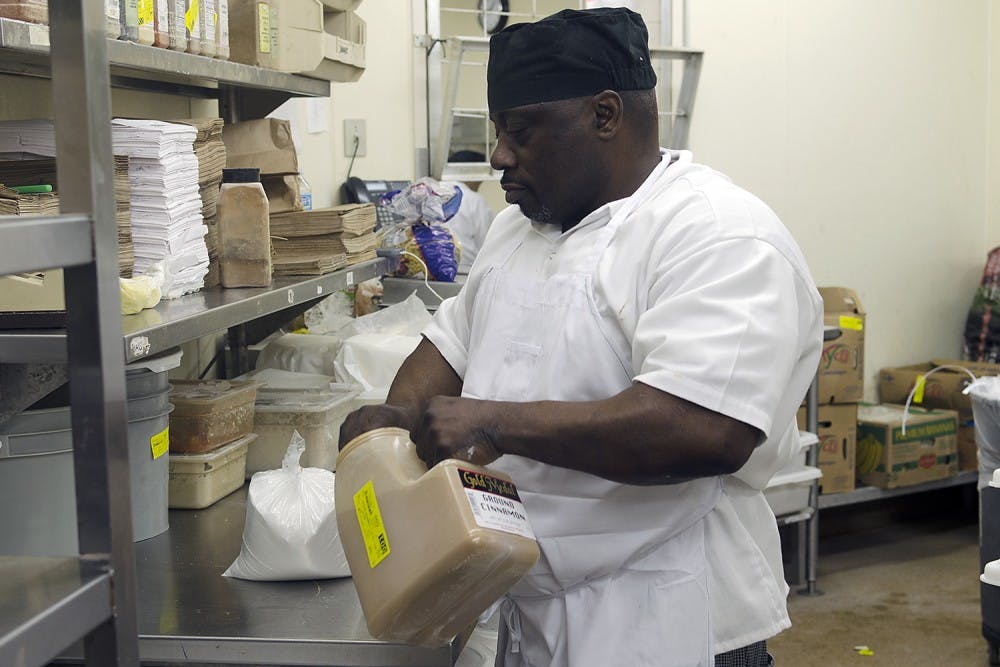Penny said the money from incentive wage jobs goes to inmates’ commissary accounts, where items like food and hygiene products can be bought.
“I don’t know how they make it,” Penny said. “That ain’t enough to get your soap or if you want a sandwich or something like that. If you ain’t got no money coming in, then you suffer.”
Now Penny works as the supervisor of the stockroom at K&W, where he was hired after his release. He is in charge of ordering the food, making sure it is seasoned and opening the building at 6 a.m. Penny said he has set his sights on a management position.
Most former prisoners face a difficult job search after release. Smith said the experience gained in work programs usually isn’t enough to balance the criminal record.
Penny initially got the K&W job through the culinary program at Orange Correctional Center.
Alicia Hughes, a program director at Orange Correctional Center, said the culinary program, which is 20 weeks long and sponsored through Piedmont Community College, is competitive for inmates to enroll in.
“There’s always a backlog,” she said.
Penny was one of 18 students in his class. He finished at the top of his class and was kept on as an assistant teacher.
“I wanted to go to cook school to get out of the other dump of a prison, Durham Correctional (Center),” he said.
Jerry Spuruill, a manager who has worked at K&W in the area for more than 25 years, said K&W still employs inmates from Orange Correctional Center, picked mostly through Penny’s recommendations.
“They work harder because they are just so happy to be out of the camp,” Spuruill said. “They tend to be a lot neater. Their uniforms are creased, and transportation makes sure they are here on time.”
Smith said prisons are able to sell labor for little or no money, sometimes to large corporations and local companies, including Tarheel Linen.
To get the day's news and headlines in your inbox each morning, sign up for our email newsletters.
“They aren’t breaking rocks anymore,” Smith said. “Some of these jobs are very important to the economy.”
And prisoners work for public agencies and private companies without substantial pay.
“As a general and public society, we don’t know about this institution that is basically hidden from us,” Smith said.
Inmates who work for labor contracts leave the prison for the day, some working alongside state highway crews. Other inmates work for county or local governments doing maintenance.
Correctional officers do not supervise these inmates. The agency that employs them goes through training and is responsible for them for the day.
Hughes said the work programs in the prison have been successful with the inmates.
“Most of the time they are very receptive,” she said. “They don’t want to be idle.”
But there are risks. Last year, Kenneth Lussier, an inmate at Orange Correctional Center, escaped from one of the work crews.
“That’s just the potential all of them have,” Hughes said. “It’s just as easy to escape out of a work crew or jump out the fence over here.”
Government agencies can also use the services of Correction Enterprises. In these jobs, inmates make goods for the agencies, including license plates and furniture.
The least-restricted and highest-paid opportunities are work-release for inmates, which Penny took advantage of. Acree said a lot of work-release inmates in the state work for fast food restaurants or in manufacturing.
Acree said the positives of inmate work programs far outweigh the negatives.
“They are paying back in a significant way,” he said.
But Smith said the prisoner gets very few benefits from participating in this system.
“Everyone benefits except the prisoner,” he said. “It’s easy economics.”
special.projects@dailytarheel.com



